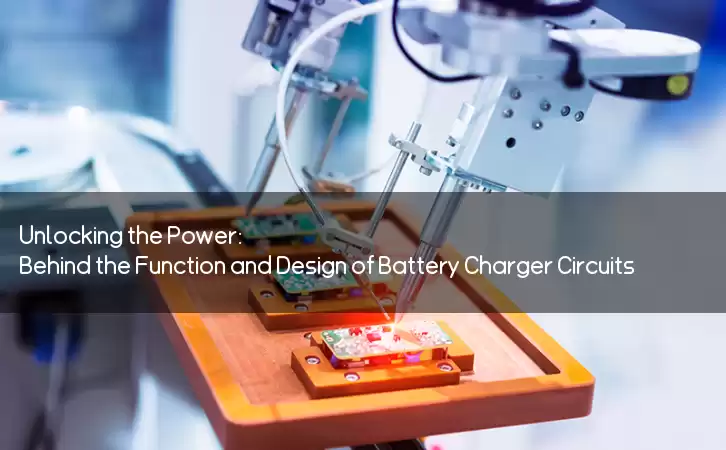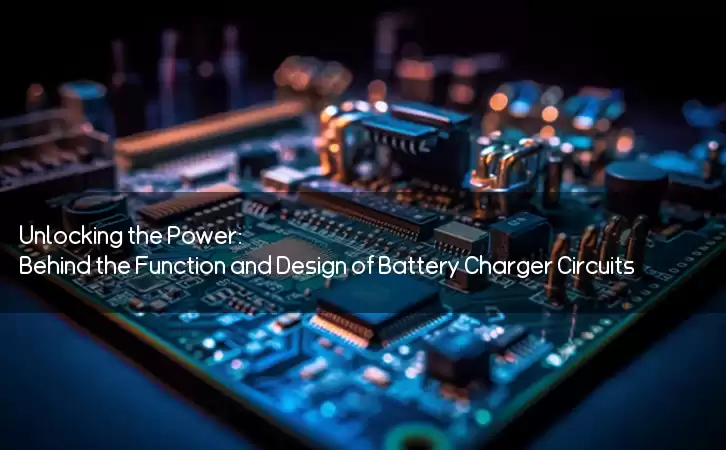Information Center
Unlocking the Power: Behind the Function and Design of Battery Charger Circuits
Published:2023-06-12 20:36:59 Author:Green WCND Views:54Battery Charger Circuit: Understanding Its Function and Design

A battery charger circuit is an electronic device that is designed to charge a rechargeable battery. It is a vital component in many portable electronic devices and serves as a key power supply solution for portable devices such as phones, laptops, and tablets. The battery charger circuit is also utilized in other devices such as vehicles, cameras, and drones.

Understanding the Function of a Battery Charger Circuit
A battery charger circuit has a primary function, which is to charge a rechargeable battery. The circuit’s design is tailored to ensure the battery is charged in a safe, effective and efficient way. The circuit typically comprises an AC power source, a transformer, a rectifier, a filter capacitor, and a voltage regulator. The voltage regulator ensures that the voltage supplied to the battery is within a predefined range, preventing overcharging, which could damage the battery cells.
When the AC power source is connected to the battery charger circuit, the transformer transforms the high voltage of the AC source to a lower level, usually around 12V or 24V, depending on the device’s requirements. The rectifier converts the AC voltage to a DC voltage, which is then filtered by the capacitor to smooth the DC waveform. The voltage regulator ensures that the voltage delivered to the battery is under a specific voltage range to prevent overcharging.
Designing a Battery Charger Circuit
The design of a battery charger circuit depends on the type of battery to be charged and the application of the device where it is used. There are several types of rechargeable batteries in use today, including Ni-Cd, Ni-MH, Li-ion, and lead-acid batteries. Each battery type has a particular charging requirement, and therefore, the battery charger circuit’s design should be tailored to meet these requirements.
When designing a battery charger circuit, several factors are considered to ensure the circuit operates efficiently and effectively. The factors include the power rating of the device, the type of battery to be charged, and the charging current capacity. The power rating determines the power rating for the transformer, the rectifier diodes, and the filter capacitor. The battery type determines the charging voltage and the charging current, while the charging current capacity determines the transformer’s rating.
Conclusion
The battery charger circuit is an essential component of many portable electronic devices, ensuring that the device is always powered. It is important to design and operate the circuit correctly to ensure safe and efficient charging of rechargeable batteries. With the ever-increasing demand for portable electronic devices, battery charger circuits will continue to play a crucial role in providing power to these devices.
Power Adapter Design and Customization Guide for Portable Electric KettlesI. Common Design Types for Portable Electric Kettle Power AdaptersPortable electric ke···
I. Common Design Types of Power Adapters External Independent Type (Most Common) Design: A standalone adapter (e.g., "black brick") connected to the p···
Handheld Vacuum Cleaner Power Adapter Selection GuideIntroductionHandheld vacuum cleaners have become a mainstream tool for household cleaning due to their port···
Drill Power Adapter Selection Guide.drill-container { font-family: Arial, sans-serif; line-height: 1.6; max-width: 800px; margin: 0 auto; padding: 20px; } .dril···





